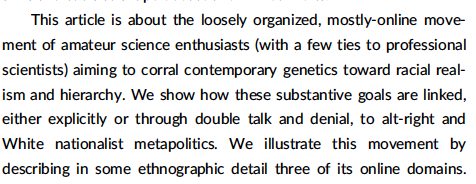I have the honor to be co-guest editing a special issue of @PhysAnth on race. This special issue, in dialogue with our @AAAGenetics session and Presidential Panel in 2019 on genetics and race, will feature a wide variety of authors and perspectives. 1/n
As articles become available in Early View, I'll add them to this thread. 2/n
Here is the first article by Aaron Panofsky, Kushan Dasgupta, and Nicole Iturriaga: How White nationalists mobilize genetics: From genetic ancestry and human biodiversity to counterscience and metapolitics. https://onlinelibrary.wiley.com/doi/full/10.1002/ajpa.24150 3/n
I should add that the special issue itself won't be published until 2021--these are just submissions available in early view--so this thread will be slow-moving. 5/n.
Happy to announce another paper in our special @PhysAnth issue on race! (It actually came out on Oct 1, sorry to be late). This paper is from @lizzie_wade: "Tips for scientists writing about race and genetics for the general public" https://onlinelibrary.wiley.com/doi/10.1002/ajpa.24151 6/n
Many thanks to @lizzie_wade for sharing her expertise in #scicomm to help genetics researchers communicate their work in a responsible and sensitive way! 7/n
In some ways, I hope this is a response to the person who asked me a couple of years ago at a conference "How do I write about my work when it's used by white supremacists?" 8/n
I'm going to start using a hashtag for our special issue of @amjphysanth. Since our special issue is going to be called "Race reconciled II: Interpreting and communicating biological variation and race in 2021", I'll use #RaceReconciled2021
Our next addition to the #RaceReconciled2021 special issue is out in Early View! This article is by Evelyne Heyer and Carole Reynaud-Paligot entitled "Us and them: From prejudice to racism. An original analysis of race and racism" https://onlinelibrary.wiley.com/doi/full/10.1002/ajpa.24158?af=R
This paper goes through the Musée de l'Homme's exhibition "Us and them: from prejudice to racism” and how they approached educating the French public on genetic variation, race, and racism. #RaceReconciled2021
Our next paper for #RaceReconciled2021 is by Ken Batai, Stanly Hooker, and Rick Kittles, entitled "Leveraging genetic ancestry to study health disparities." https://onlinelibrary.wiley.com/doi/10.1002/ajpa.24144
The authors argue that self-reported race and ethnicity "precludes independent analysis of important factors, such as genetics and the physical and social environments which vary significantly within populations."
Updating the #RaceReconciled2021 thread today with a few new papers now out at @amjphysanth in Early View!
First is a paper by @DrAdHoc entitled "Janus-faced race: Is race biological, social, or mythical?" https://onlinelibrary.wiley.com/doi/full/10.1002/ajpa.24169
In this paper he argues that not only is race not a biological reality, we are misguided in claiming it as a social construct as well. Instead, he argues, we should make a distinction between "race" and "racialized group".
We also have an important contribution from @Anthrofuentes entitled "Biological anthropology's critical engagement with genomics, evolution, race/racism, and ourselves: Opportunities and challenges to making a difference in the academy and the world" https://onlinelibrary.wiley.com/doi/10.1002/ajpa.24162
(redoing that last tweet because I posted the wrong screenshot)
Dr. Fuentes reflects on the discipline of physical/biological anthropology in this piece: what it has been, what it is currently, and the changes we must effect in our discipline in order to live up to our potential and be a truly impactful discipline.
Another paper is out in Early View for #Racereconciled2021. This one, by Carter Clinton and Fatimah Jackson, is entitled "Historical overview, current research, and emerging bioethical guidelines in researching the New York African burial ground" https://onlinelibrary.wiley.com/doi/10.1002/ajpa.24171 21/n
For those of you not familiar with it, the New York African Burial Ground site is "the oldest and largest burial site of free and enslaved Africans," and the study of its (re)discovery, excavation, treatment of the remains, and conservation of the site is given here. 22/n
Carter and Jackson outline how they and the research team at Howard University have approached balancing ethical issues with respectful research. They call for the development of culturally-appropriate protocols for future finds of similar historical sites. 23/n.
Do please read this article, I think it's very important (and it's open access for now!). 24/n
Another paper for the #RaceReconciled2021 special issue of @amjphysanth is now out! This article, entitled "Race, eugenics, and the canceling of great scientists" is by @AdamRutherford. https://onlinelibrary.wiley.com/doi/full/10.1002/ajpa.24192?saml_referrer
In this paper, @AdamRutherford grapples with the complexity of dealing with the legacies of scientists whose work is integral to the foundations of our disciplines, but who were undeniably racist.

 Read on Twitter
Read on Twitter







